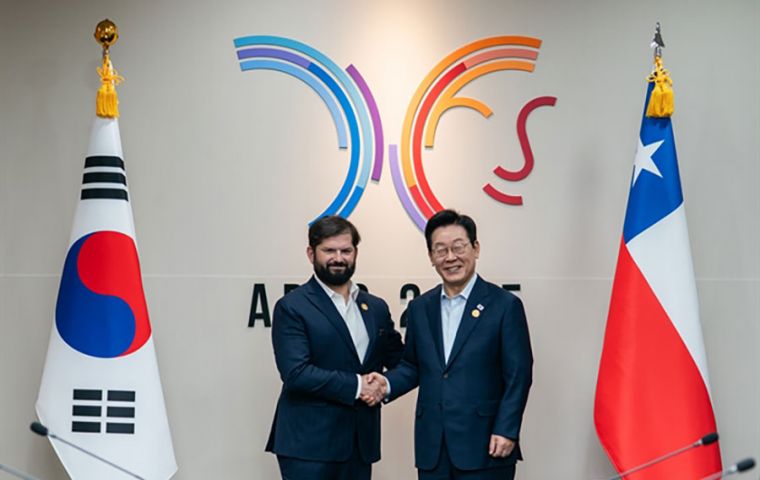MercoPress. South Atlantic News Agency
Presidents of Chile and South Korea agree to deepen ties
 Lee and Boric pledged to combine South Korea's technology with Chile's energy and mineral resources. Photo: Presidency of Chile
Lee and Boric pledged to combine South Korea's technology with Chile's energy and mineral resources. Photo: Presidency of Chile South Korean President Lee Jae-Myung and his Chilean counterpart, Gabriel Boric Font, met on Friday in Gyeongju (South Korea), on the sidelines of the Asia-Pacific Economic Cooperation (APEC) summit, to discuss expanding bilateral cooperation in various key sectors.
Lee emphasized the special relationship between the two nations, noting that Chile was the first Latin American country to recognize the Republic of Korea and the first to sign a Free Trade Agreement (FTA) with it. “After completing its democratic system, Chile has maintained a long-standing cooperative relationship with South Korea in various sectors,” Lee said.
Boric confirmed the bilateral commitment, acknowledging that while negotiations to update their existing FTA are currently stalled, Chile was eager to improve the treaty.
The two leaders reached crucial understandings to boost their economic and diplomatic partnership. They agreed that powerful synergy can be achieved by combining South Korea's advanced manufacturing technology with Chile's abundant energy and mineral resources.
They also committed to expanding cooperation and exchange in the cultural industry, referencing the popularity of K-pop and Korean literature.
The leaders pledged to cooperate closely at the UN General Assembly in December to support their co-hosting of the 4th UN Conference on Oceans in 2028.
Additionally, President Lee presented his “END” initiative (Exchange, Normalization, Denuclearization) aimed at easing tensions with North Korea and requested Chile’s diplomatic support. Boric highlighted that despite the 18,000-kilometer distance, South Korea is highly present in Chile and served as a reference during its transition to democracy.
During the final day of the APEC leaders’ meeting, President Boric also focused on social and technological innovation. He stressed the importance of consolidating social policies to strengthen women's inclusion in the labor market. Boric also highlighted the National Care System and nursery reform, aimed at ensuring that “being a mother is not a form of discrimination” in the workforce.
“Currently, material goods greatly condition the expansion of families, at least in developed and developing countries, so offering safer and more stable conditions for the inclusion of women in the labor market is extremely important,” Boric pointed out.
Boric also promoted a joint initiative between Chile and Brazil to create a Latin American language model called Latam-GPT. This effort aims to ensure that artificial intelligence reflects Latin American culture and identity. He invited APEC members to view Chile as a “gateway to Latin America” and a regional hub for technological and cultural trade.
Meanwhile, the APEC leaders concluded their two-day meeting by adopting the Gyeongju Declaration, which reaffirmed that strong trade and investment were vital to the region's prosperity. However, the document lacked any reference to the multilateral trading system with the WTO at its core, probably in light of Donald Trump's return to the White House and his “America First” policies.
The declaration did, however, recognize cultural and creative industries as a new engine of growth and reflected a shared commitment to cooperation on artificial intelligence (AI) and demographic changes—two key initiatives promoted by South Korea as the host.




Top Comments
Disclaimer & comment rulesCommenting for this story is now closed.
If you have a Facebook account, become a fan and comment on our Facebook Page!